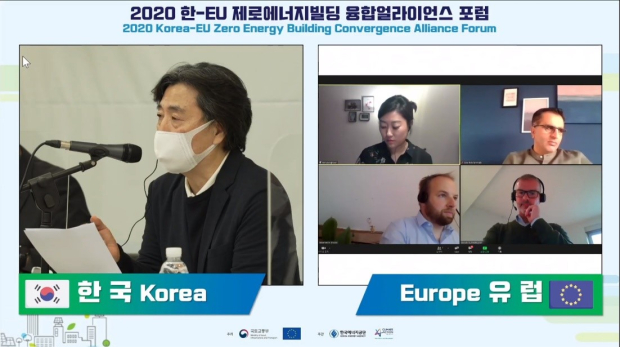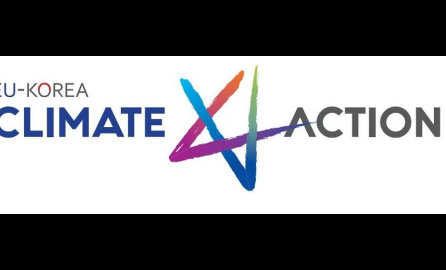Event 2. The Zero Energy Building Convergence Alliance Forum
The 2020 EU-Korea Zero Energy Convergence Alliance Forum was held on 27 October 2020, focusing on the roles of Zero Energy Buildings in implementing the Green New Deal policy. Gordon Sutherland, Head of Buildings & Heating/Cooling Sector at the Executive Agency for Small and Medium-sized Enterprises of European Commission (EASME), Maarten De Groote, Senior Expert at Vito-Energyville, Min-young Kwon, Researcher at the Delft University of Technology, and Saleh Mohammadi, Senior Energy Concept Developer at Witteveen+Bos were invited as EU speakers. Seung-Eon Lee, Senior Research Fellow at the Korea Institute of Civil Engineering and Building Technology, Jong-Ho Yoon, Professor at the Hanbat University, and Deok-Jun Park, Building Energy New Business TF Leader at the Korea Conformity Laboratories, participated as Korean speakers.
The event started with opening remarks by representatives of the Korea Energy Agency, the Ministry of Land, Infrastructure and Transport, and the EU Delegation to Korea. Ms. Maria Castillo Fernandez, the Ambassador of the EU to Korea emphasized that the EU’s Green Deal and Korea’s Green New Deal can play a stepping stone to produce synergies in improving building energy performance in both regions.
Seung-Eon Lee delivered his keynote speech covering the climate goal and direction of the Korea’s Green New Deal policy, the market potential to improve energy efficiency of the building sector to achieve the Green New Deal’s climate target, and the expected market cost to deliver the improved building energy policy. He pointed out that the renovation rate of existing buildings is particularly low in Korea compared to the market potential, which requires either the government’s support or regulations to activate the market. He urged the Korean government to strengthen the GHG reduction target for the building sector in line with the 2050 carbon neutrality goal, to develop the building energy performance policy in more detail, and to design a concrete strategy in order to deliver the policy in the most cost efficient manner.
The second presentation was delivered by Jong-Ho Yoon, presenting his study results of monitoring ZEB performance of four selected zero energy houses compared with the ones of ZEB residential complex and normal residential complex buildings, and providing policy recommendations to expand ZEB. According to his study results, the energy consumption levels in normal collective residential buildings is 164kWh/m2 per year compared to 74.83 kWh/m2 for ZEB houses and 138.5kWh/m2 for collective ZEB residential buildings. He mentioned that the user behavior is very important to achieve the original goal of ZEB, which is to reduce energy consumption and GHG emissions.
Deok-Jun Park delivered the third presentation focusing on the Korean policy on Zero Energy Building obligation and technology development measures to achieve the policy goal. He said the Korea’s Zero Energy Building Policy is aimed for a transition to a low carbon society by creating a new market for zero energy buildings and motivating the market with various policy measures. He informed about the Korean government policy measures to create a new industry and market, covering aspects such as: development of the required value chain, support innovative technology commercialization and SMEs, providing customer’s information on low carbon products and support in the market expansion, and enforcement of building energy efficiency certificate display targeted at public and large commercial buildings.
Afterwards, Gordon Sutherland presented on the EU’s policy on nZEB as the first speaker from the EU. He covered the EU’s revised Energy Performance of Buildings Directive (EPBD), Smart Finance for Smart Building Initiative, sustainable built environment projects, the BUILD Up Skills initiative which is a strategic initiative of the EC to boost continuing and further training of craftsmen, on-site construction workers, and system installers in the building sector. He said that the EU has funded a series of projects which are looking at prefabricated holistic renovation solutions to take less time on site and are less disruptive for the occupants. One of the projects which used prefabricated systems for the energy efficient building renovation and has shown 60% of deep renovation with a low intrusiveness can be achieved and reduced time spent on the site by 30%.
The second European speaker was Maarten de Groote who introduced three main indicators to assess the values of a house which are Smart Readiness Indicators, Comfort Indicators, and Air Pollution Indicators. Smart Readiness Indicators address energy saving and maintenance, comfort and convenience, health and wellbeing, information to occupants, grid flexibility and storage. Comfort Indicators address thermal comfort, indoor air quality, visual comfort, acoustic comfort while Air Pollution Indicators can be measured using the indoor air purity index. He emphasized the need for introducing such different indicators and to record the monitoring results in the logbook to be used in managing buildings throughout the life cycle and making decisions on renovation.
Min-young Kwon presented nZEB policies in the Netherlands, covering the definition of nZEB, Dutch nZEB policies (BENG: Bijna Energienutrale Gebouwen, nearly energy neutral building), Green Building labels, and the best examples. The final presentation was delivered by Saleh Mohammadi who introduced the three sustainable design principles of Wittenveen+Bos which are: reducing energy consumption in buildings by avoiding waste and implementing energy saving measures, using sustainable energy sources instead of fossil fuels, and producing and using fossil fuels efficiently. He also covered the Aquifers Thermal Energy System (ATES) technology as a sustainable energy production and consumption measure, which allows utilization of local geothermal energy through heat exchangers and heat pumps and distribution of the produced energy to buildings through a heat network.
The Q&A session was followed after the presentation session. In responding to the question on the difference between a digital logbook and a building renovation passport, Maarten answered that a digital logbook is in a gateway allowing access to different indicators, tools and services while building renovation passports are a roadmap showing the actions that building owners should take to ensure their desired energy performance level. There was a question to Min-young Kwon asking about what kind of building energy is subject to BENG. She mentioned that BENG only considers building-related energies; therefore, energy for plugs are excluded from the regulation. There was a question if ATES (Aquifers Thermal Energy System) could be applied in the Korean context to Saleh Mohammadi. He responded that a similar project has already started in the Busan Smart City.

Related documents
Zero Energy Architecture's Role in Green New Deal - Seung-Eon Lee
English (5.48 MB - PDF)Monitoring of Building Energy Performance and Strategies - Jong-ho Yoon
English (4.51 MB - PDF)The EU's Strategies to Create Jobs and Foster Industry Related ZEB - Gordon Sutherland
English (1.51 MB - PDF)Innovative Indicators for Energy Performance Certification of Buildings - Maarten De Groote
English (2.45 MB - PDF)ZEB Policy and Cases for Non-Residential and Public Buildings in the Netherlands - Min-young Kwon
English (9.41 MB - PDF)A Strategic Area Approach to Energy Transition in the Built Environment - Saleh Mohammadi
English (2.38 MB - PDF)Technology Commercialization and Market Expansion According to the ZEB Roadmap - Deok-Jun Park
English (5.55 MB - PDF)2020 ZEB Forum_Program
English (462.38 KB - PDF)